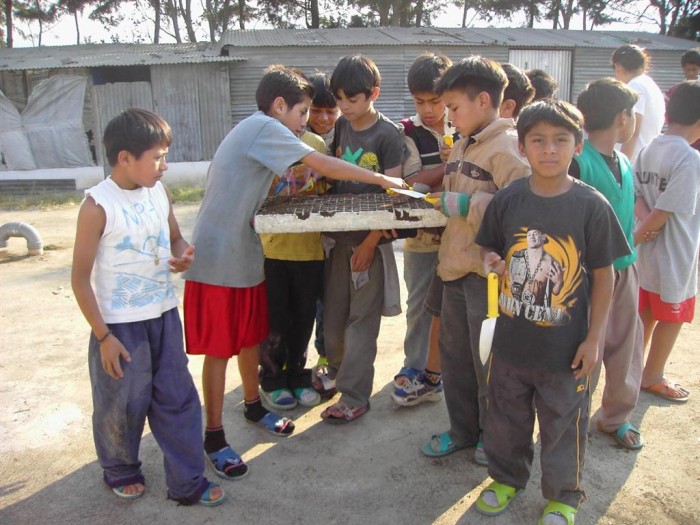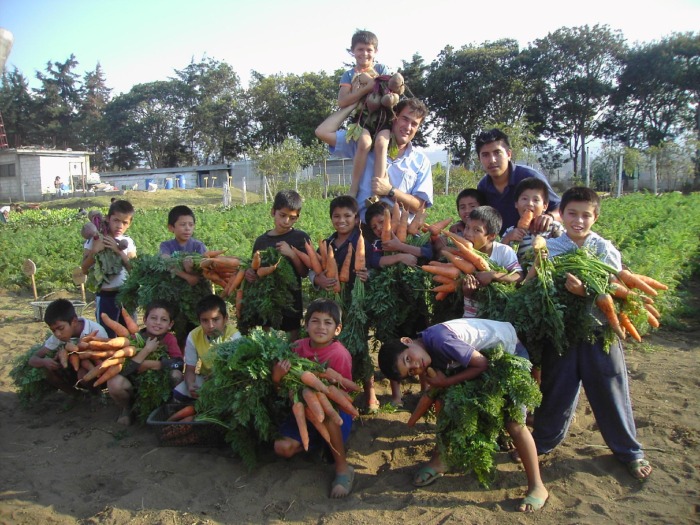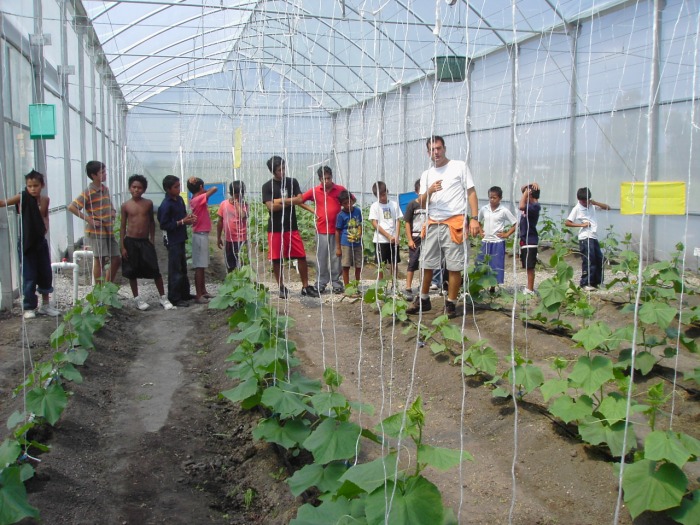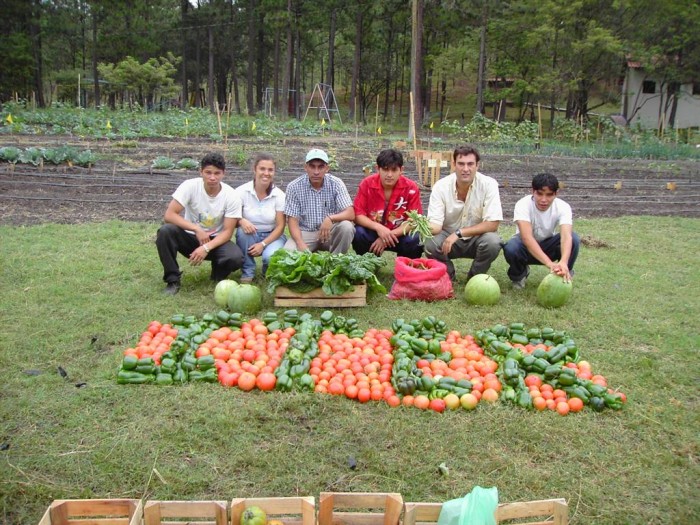Contributing € 5
Agradecimiento
Agradecimiento y satisfacción personal al contribuir a hacer posible este proyecto.
> 00 Co-financiers
Goteo ha construido una historia única en el mundo del micromecenazgo. ¿Quieres seguir formando parte de ella?
APRENDE Y EMPRENDE LA PRODUCCIÓN DE HORTALIZAS
 Min.
Min.
 Opt.
Opt.
 Babahoyo, Los Ríos, Ecuador
Babahoyo, Los Ríos, Ecuador
Agradecimiento y satisfacción personal al contribuir a hacer posible este proyecto.
Te enviaremos una foto 20 x 15 de recuerdo del proyecto que recoja las sonrisas y los kilos que has ayudado a producir + agradecimiento y satisfacción personal al contribuir a hacer posible este proyecto.
Te enviaremos una carta de agradecimiento escrita por un niño beneficiario del proyecto + una foto 20 x 15 que recoja las sonrisas y los kilos que has ayudado a producir + agradecimiento y satisfacción personal al contribuir a hacer posible este proyecto.
Te enviaremos un DVD con todas las fotos del proyecto + una carta de agradecimiento escrita por un niño beneficiario del proyecto + una foto que recoja las sonrisas y los kilos que has ayudado a producir + agradecimiento y satisfacción personal al contribuir a hacer posible este proyecto.
Te enviaremos un álbum con las fotos del proyecto + un DVD con todas las fotos + una carta de agradecimiento escrita por un niño beneficiario del proyecto + una foto que recoja las sonrisas y los kilos que has ayudado a producir + agradecimiento y satisfacción personal al contribuir a hacer posible este proyecto.
Te haremos una presentación personal con un video del proyecto , te explicaremos el proyecto y compartiremos nuestras vivencias + un álbum con las fotos del proyecto + un DVD con todas las fotos + una carta de agradecimiento escrita por un niño beneficiario del proyecto + una foto que recoja las sonrisas y los kilos que has ayudado a producir + agradecimiento y satisfacción personal al contribuir a hacer posible este proyecto.
Publicaremos tu logo o nombre en todos los documentos del proyecto como cofinanciador + te haremos una presentación personal con un vídeo del proyecto, te explicaremos el proyecto y compartiremos nuestras vivencias + un álbum con las fotos del proyecto + un DVD con todas las fotos + una carta de agradecimiento escrita por un niño beneficiario del proyecto + una foto que recoja las sonrisas y los kilos que has ayudado a producir + agradecimiento y satisfacción personal al contribuir a hacer posible este proyecto.
Te invitaremos un fin de semana a Xabia a nuestra casa, para compartir contigo un gran fin de semana en XABIA, un lugar único en la costa mediterránea de una belleza excepcional. Serás nuestro invitado de honor, por tu generosidad con esta iniciativa
Agricultural training of children and young people to undertake growing vegetables in greenhouse and opened field in Babahoyo, Ecuador
 Task
Task
|
Minimum | Optimum |
|---|---|---|
|
Varios y retornos ofrecidos,
Apoyo a los alumnos, desplazamientos en buses, meriendas, apoyos puntuales a los niños o jóvenes más vulnerables, o más necesitados, por ej botas de agua, o necesidades puntuales, y gastos asociados a la iniciativa del CROWNFUNDING, como comisiones del 4 % para Goteo, los DVD y álbumes fotográficos del proyecto para los retornos establecidos y gastos de envío. Limitados a España y Ecuador, el envío de los Albumnes fotográficos del proyecto.
|
€ 200 | |
|
Visitas educativas
Todo proyecto educativo que se precie debe realizar visitas educativas con los niños y jóvenes a explotaciones agrícolas horticultoras o centros educativos agrícolas que produzcan hortalizas. Para costear estas visitas educativas solicitamos los 300 € que son para pago de transporte o movilización.
|
€ 300 | |
|
Billetes de avion
La asociación ITER, semilla solidaria, la ayuda que crece nos financia los Billetes de avión Valencia-Quito-Valencia. Estos fondos ya se tienen.
|
€ 1 |
 Material
Material
|
Minimum | Optimum |
|---|---|---|
|
Material educativo
Todo proyecto educativo debe contar con medios para la formación. Por ej. pizarras, libros, cuadernos, hojas, bolígrafos, fotocopias, deseable un proyector para audiovisuales, y materiales educativos diversos cartulinas, pegamento, tijeras, rotuladores, marcadores, grapadora, folders...etc
|
€ 600 | |
|
Equipos y suministros
Equipos y herramientas para los huertos. Material de riego, manguera portagoteros, accesorios codos, T, válvulas, tubería de PVC o polietileno, herramientas para las tareas de cultivo (carretillas, azadas, palas, rastrillos, tijeras podadoras, regaderas, semilleros), e insumos, semillas, fertilizantes, fitosanitarios, trampas cromáticas, sustrato vegetal, y por último cajas para la cosecha. Con los 1.100 € solicitados podemos cubrir las necesidades de equipos y suministros.
|
€ 1.100 |
 Infrastructure
Infrastructure
|
Minimum | Optimum |
|---|---|---|
|
Invernadero
1 módulo de invernadero tipo Multitúnel KIT APR-336 m2 formado por 1 túnel de 8x42 metros, con una superficie total de 336 m². Disponemos de la cotización y detalle del invernadero y equipo de riego, que subiremos a internet. 10 €/m2 invernadero.
|
€ 3.300 | |
| Total | € 2.201 | € 5.501 |
The project consists of the construction of a 336 m2 greenhouse with its equipment of trickle irrigation and fertirrigation (3500€) for the formation and qualification of the children and young people. In order that they are able to produce their own vegetables and to undertake the production of vegetables autonomously, once they have learnt and they have become familiar with the techniques for the production of vegetables in the greenhouse or in their courtyards.
It is an eminently educative project, the production of vegetables techniques’ are taught and trained. At the same time it is a productive project since it incorporates a greenhouse that gives a greater security in the production of vegetables against rains, plagues and diseases.
We teach how to produce vegetables by transferring technical knowledge, for a profitable, healthy and high quality production, through the methodology of learning-by-doing. We guarantee the sustainability and continuity of the project over time. All the previous editions of the project are alive and working (See video: www.youtube.com/watch).
The main intention is to qualify and train 60 young people and 360 children of the Thomas Martinez School (Babahoyo, Ecuador), in the intensive production of vegetables in greenhouse with 5 objectives:
1º Improve the health and the nutrition of the kids, guaranteeing a regular presence of fruits and vegetables in their diet. Reach the recommendation of the WHO, to consume daily 400 gr of vegetables. To this end, we will produce annually 2500 kilos of vegetables in this greenhouse.
2º Improve children’s self-esteem, this is the most valuable and spectacular result of the project. The children and young people increase their self-esteem and confidence when they see that they are able and have learnt how to transform the seeds into vegetables. The previous experiences have shown a remarkable improvement in the self-esteem and the behaviour of the children who participated in the vegetables classes.
3º Improve their school performance. Increase their interest in the studies when finding a practical utility to the knowledge learned in the school. In ITER we have reached a very satisfactory and rewarding answer from the pedagogical point of view, with remarkable improvements in their grades and learning. “This student has improved in a 95% his conduct in the classroom and the school”. Note of the teacher of Eduardo Echevarría, student of the project of Dominican Republic. We already have 4 agricultural youngsters who participated in the previous projects graduated as Agronomist Engineers and 6 Agronomic Bachelors.
4º Teach the children the advantages of recycling residues. Separate the inorganic and organic residues for the elaboration of compost. Implement the selected collection and treatment of the home residues for the recycling of paper, glass and packages; in order to involve the children in the care of the natural resources and the protection of the environment.
5º Improve the possibilities for the incorporation to the labour market, in a mainly agricultural country, of the youngsters participating in the project.
Is in our mind and our desire is that once built, put in production and proved the economic and technical viability of the greenhouse; the project is multiplied and replicated in different regions of the country, as an instrument and strategy for the eradication of the poverty by income (income lower than 70$/month). With the greenhouse, in 336 m2, monthly income higher than 100$/month, with two modules of 200$/month per year, can be generated and guaranteed.
The undernourishment reduces the brain, truncates the physical development of the children and limits their learning. If the children learn how to produce their own vegetables, they will not suffer undernourishment.
1º Teach 60 young people and 360 children of the Thomas Martinez school of the agricultural property The Clementine how to produce vegetables to improve their diet and their nutrition, through the methodology of learning-by-doing. For this purpose, a greenhouse of 336 m2 that protects of rains and plagues will be constructed. Moreover, an orchard of vegetables and fruit trees will be realised in the school, with didactic aims.
2º The children and young people that participate in the project will be given technical help and aid to begin the production of vegetables in the courtyard of their houses.
3º Two agronomist engineers will live in the farm The Clementine during a year, to realise the project, give the horticultural classes and boost the production of vegetables. They are the same ones that have presented this initiative of crowdfunding to raise funds to improve and to multiply the social impact of the project.
4º When the project is done there will be more than 2500 kilos of vegetables produced by the children and the young people, they will know the techniques to produce vegetables and there will be X family gardens in their houses.
5º To prove with facts and kilos reaped, the suitability and the economic viability of producing vegetables in greenhouses. It is expected a multiplication and replication of the project in other places of the country, spreading the production of vegetables in families greenhouses that guaranteed a good nutrition and monthly regular income higher that 100$, to eradicate the poverty by income in rural areas.
6º It will be a model and a reference for other institutions that work in the fields of food safety, eradication of poverty and children nutritional improvement, in Ecuador or other countries. All the knowledge generated in this experience will be published so that other institutions, communities and people can benefit from it.

It is known that undernourishment truncates the physical and intellectual development of the children and limits their learning capacity; and thus their opportunities to escape from the poverty in which they were born. Therefore we think that improving nutrition through the production of vegetables throughout the year, in a greenhouse is a measure that will end up with malnutrition. Teaching children and young people how to grow vegetables locally and in confined spaces (336 m2), would be an effective model to fight against malnutrition and poverty, and to improve the development of children and youth brains and their ability to learn.

1º Teach and develop abilities in 360 children and 60 youngsters for production of vegetables locally.
2º Produce more than 2,500 kilos of vegetables annually. In order to improve the nutrition and the food safety of the children and young people of the farm The Clementine.
3º Be a model and a reference for other institutions that work for children, poverty eradication and childhood malnutrition.
4º The present request of funds is to improve the project and to have resources to cover the expenses for operating the project and the agricultural inputs for the multiplication of home gardens.
5º In ITER web site the results of the experience would be socialized, looking for the multiplication and spread of this initiative by other social institutions or entrepreneurs who work in the fields of childhood malnutrition and poverty eradication.

This project began in the 2006 like a pilot experience in an orphanage in Honduras, where it was evaluated the suitability and relevance of installing a 500m2 greenhouse with trickle irrigation for the production of vegetables, with the aim of teaching the children how to produce their own vegetables, under the methodology of learning-by-doing, in a playful and funny way for them. So that, they could incorporate the vegetables to their regularly diet and thus improve their health and their school performance by improving their nutrition.
The funds requested will provide continuity to this successful pilot project carried out in 2006 in Honduras (1600 kg), experience that then has been replicated with even greater reach and success in other orphanages in the following countries: 2007 Mexico (3400 kg), 2008 Guatemala (5400 kg), 2009 Dominican Republic (5200 kg) and 2010 Nicaragua. In the five countries the project continues working; this is the best indicator of its suitability and relevance, the continuity and the sustainability of the project independently, with its own resources, after 9, 8, 7, 6 and 5 years respectively. That shows that it is a good project, beneficial for the population, and sustainable over time, the project generates the resources for its maintenance and sustainability. You can see these projects on the following link: www.youtube.com/watchUnhandled
After the successes and achievements of these experiences, both in kilos of vegetables harvested, and in the change in the attitude of the children and youth who have participated in the projects, we want to repeat the experience in Ecuador in 2015, convinced of the benefits that this project has for children and young people, as well as for the institution or local counterpart.
Project managers
We are a marriage of cooperating agronomist engineers who has been collaborating for 20 years with different institutions, cooperation agencies, international agencies and NGO's. With our children Rubén and Andrea, we have visited different countries of all around the world, which has allowed us to acquire a great experience in working with rural households and small-scale producers of scarce resources and strong productive limitations, helping to improve the food security of the beneficiary families of the projects in which we have participated: 1990-1992 Bolivia, 1993-1995 El Salvador, 1996 Sao Tome and Principe, 1997 Ecuador, 2000 Namibia, 2001-2003 Guatemala, 2004 Philippines, 2005 Guatemala, 2006 Honduras, 2007 Mexico, 2008 Guatemala, 2009 Dominican Republic, 2010 Nicaragua, 2013-2014 Spain.
We firmly believe that "education is what is going to lift these children out of the poverty that were born". Our goal is to teach children from the rural areas how to produce vegetables, so that they can develop a productive and better life, thus contributing to hunger and poverty eradication.
And what encourages us to follow? The immense gratification that this kind of work gives us, it gives a lot of happiness thinking that you've been able to contribute, even if slightly, to improve the lives of others in some way. And now that we are working with children, the greatest encouragement is to see their faces of satisfaction and happiness, their smiles and the love they give us.



Agradecimiento
Agradecimiento y satisfacción personal al contribuir a hacer posible este proyecto.
> 00 Co-financiers
Agradecimiento + Foto
Te enviaremos una foto 20 x 15 de recuerdo del proyecto que recoja las sonrisas y los kilos que has ayudado a producir + agradecimiento y satisfacción personal al contribuir a hacer posible este proyecto.
> 10 Co-financiers
AGRADECIMIENTO + FOTO + CARTA PERSONAL
Te enviaremos una carta de agradecimiento escrita por un niño beneficiario del proyecto + una foto 20 x 15 que recoja las sonrisas y los kilos que has ayudado a producir + agradecimiento y satisfacción personal al contribuir a hacer posible este proyecto.
> 12 Co-financiers
AGRADECIMIENTO + FOTO + CARTA + DVD
Te enviaremos un DVD con todas las fotos del proyecto + una carta de agradecimiento escrita por un niño beneficiario del proyecto + una foto que recoja las sonrisas y los kilos que has ayudado a producir + agradecimiento y satisfacción personal al contribuir a hacer posible este proyecto.
> 08 Co-financiers
AGRADECIMIENTO + FOTO + CARTA + DVD + ALBUM DE FOTOS
Te enviaremos un álbum con las fotos del proyecto + un DVD con todas las fotos + una carta de agradecimiento escrita por un niño beneficiario del proyecto + una foto que recoja las sonrisas y los kilos que has ayudado a producir + agradecimiento y satisfacción personal al contribuir a hacer posible este proyecto.
> 06 Co-financiers
AGRADECIMIENTO + FOTO + CARTA + DVD + ALBUM DE FOTOS + PRESENTACION PERSONAL
Te haremos una presentación personal con un video del proyecto , te explicaremos el proyecto y compartiremos nuestras vivencias + un álbum con las fotos del proyecto + un DVD con todas las fotos + una carta de agradecimiento escrita por un niño beneficiario del proyecto + una foto que recoja las sonrisas y los kilos que has ayudado a producir + agradecimiento y satisfacción personal al contribuir a hacer posible este proyecto.
> 00 Co-financiers
Publicación del logo
Publicaremos tu logo o nombre en todos los documentos del proyecto como cofinanciador + te haremos una presentación personal con un vídeo del proyecto, te explicaremos el proyecto y compartiremos nuestras vivencias + un álbum con las fotos del proyecto + un DVD con todas las fotos + una carta de agradecimiento escrita por un niño beneficiario del proyecto + una foto que recoja las sonrisas y los kilos que has ayudado a producir + agradecimiento y satisfacción personal al contribuir a hacer posible este proyecto.
> 00 Co-financiers
Un fin de semana en Xabia en nuestra casa.
Te invitaremos un fin de semana a Xabia a nuestra casa, para compartir contigo un gran fin de semana en XABIA, un lugar único en la costa mediterránea de una belleza excepcional. Serás nuestro invitado de honor, por tu generosidad con esta iniciativa
> 00 Co-financiers
Edición de vídeos con las fotos que mandemos del proyecto. Edición y confección de Álbum fotográfico. Elaboración de una presentación en p
Difusión y publicidad de los alcances del proyecto en las redes sociales, medios de comunicación, prensa y televisión, Comunity manager para gesti
Asesoramiento técnico especifico, ej variedades de hortalizas mejores para climas tropicales. Asesoramiento de casas de semillas para climas tropical
En Ecuador, lugar donde se desarrolla el proyecto, en préstamo, se necesitarán andamios y herramientas, pistola taladradora, tenazas, revolvedora pa
Buscamos jefes de campaña por provincias, personas que se encarguen de divulgar, difundir y promocionar el proyecto en cada provincia. Tenemos jefes